Seasonality in Tourism Industry: Ibis Portsmouth Center Hotel Report
VerifiedAdded on 2022/12/15
|33
|9227
|214
Report
AI Summary
This report delves into the complexities of seasonality within the tourism industry, using the Ibis Portsmouth Center Hotel as a focal point. The introduction provides an overview of the topic, defines the research problem, outlines the organization's profile, and justifies the research's rationale, including its objectives and research questions. The literature review explores the fundamental understanding of seasonality in tourism, its impacts, and the relevant factors influencing the industry. The research methodology section details the approach taken to gather and analyze data, including the use of a questionnaire. The findings and analysis chapter presents and interprets the collected data, potentially using tables and charts to illustrate key insights. Finally, the conclusion and recommendations offer actionable strategies for managing seasonality, along with suggestions for future research, supported by a comprehensive list of references and appendices, such as the questionnaire used in the study. The report aims to identify the impacts of seasonality and strategies for promoting it within the tourism industry.
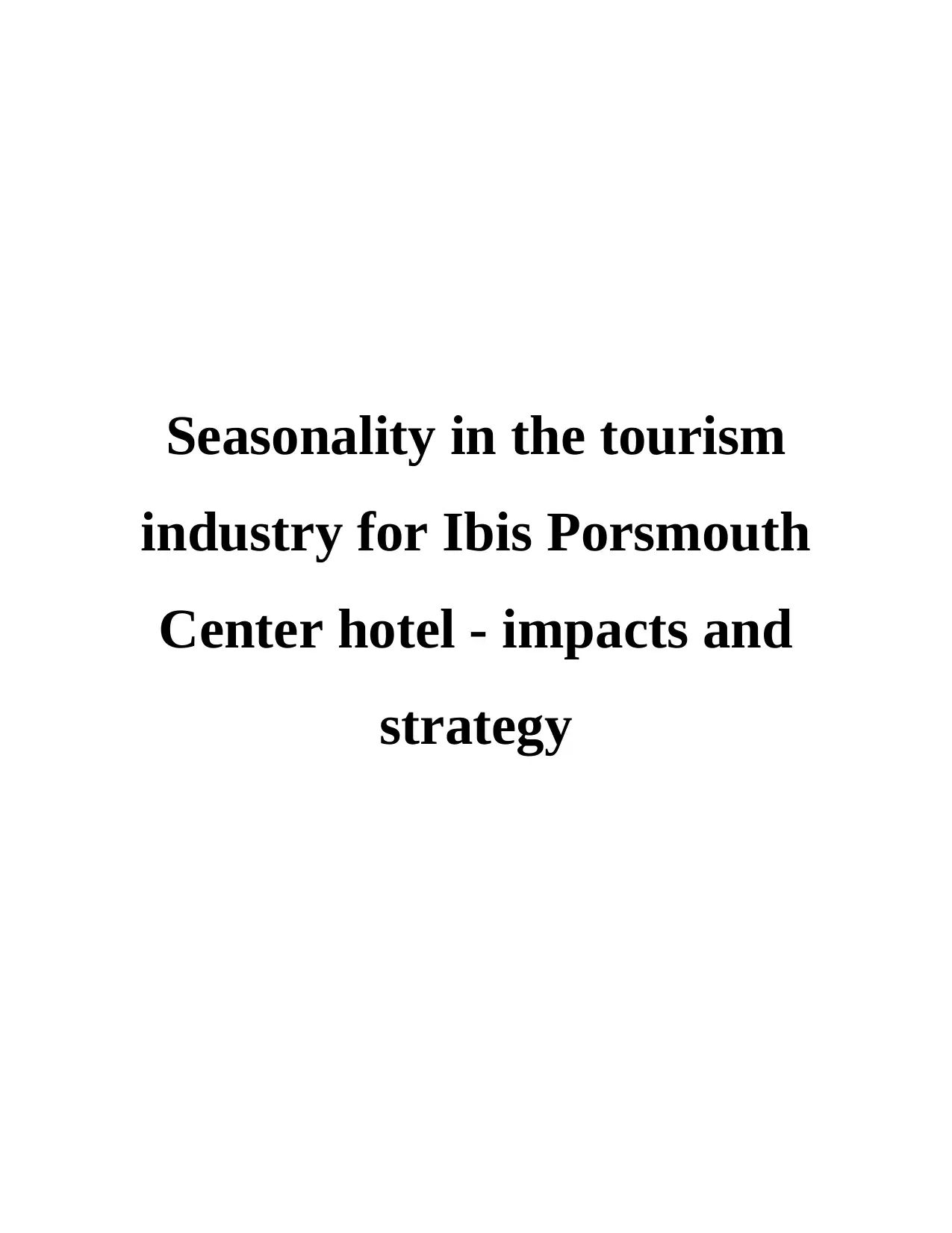
Seasonality in the tourism
industry for Ibis Porsmouth
Center hotel - impacts and
strategy
industry for Ibis Porsmouth
Center hotel - impacts and
strategy
Paraphrase This Document
Need a fresh take? Get an instant paraphrase of this document with our AI Paraphraser
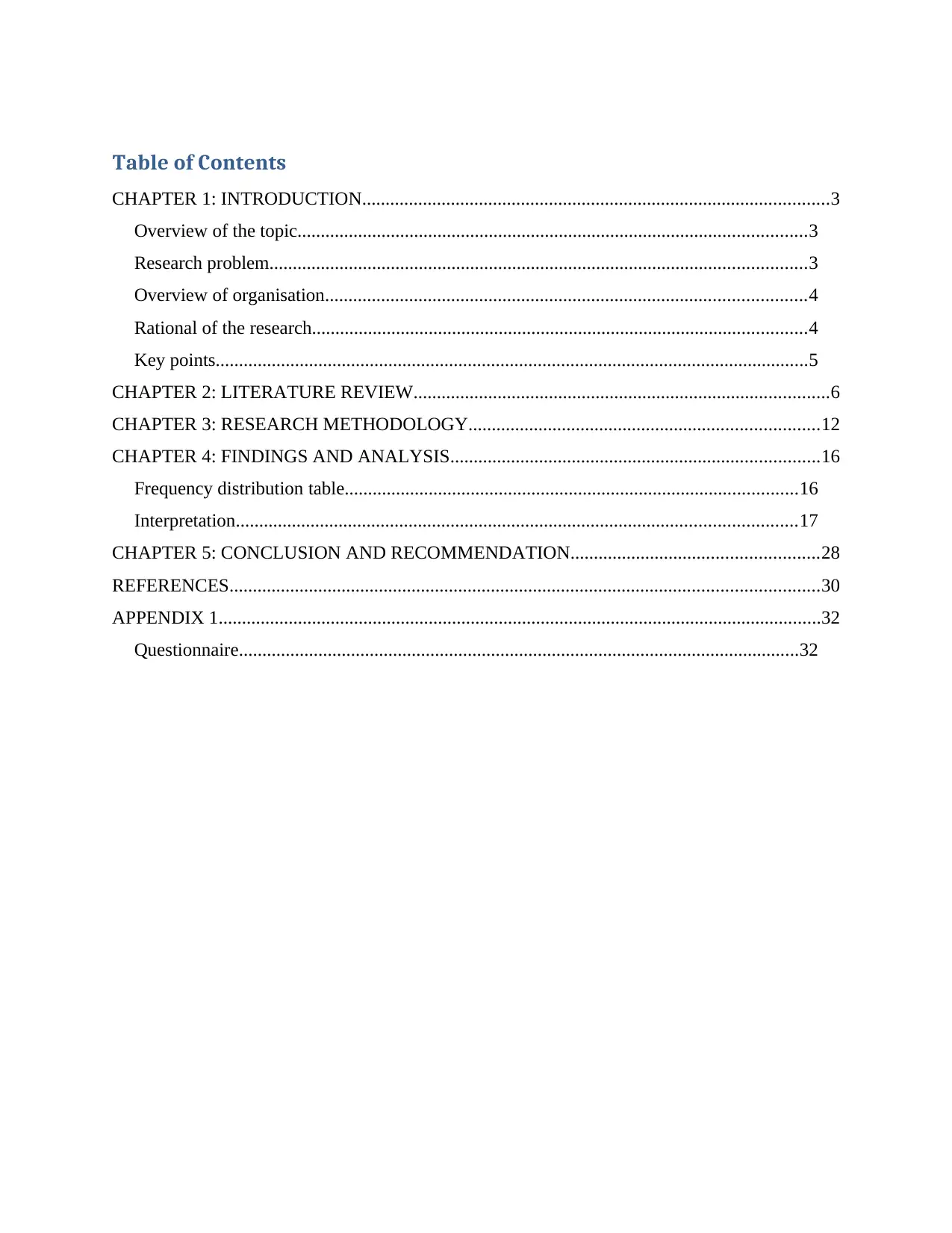
Table of Contents
CHAPTER 1: INTRODUCTION....................................................................................................3
Overview of the topic.............................................................................................................3
Research problem...................................................................................................................3
Overview of organisation.......................................................................................................4
Rational of the research..........................................................................................................4
Key points...............................................................................................................................5
CHAPTER 2: LITERATURE REVIEW.........................................................................................6
CHAPTER 3: RESEARCH METHODOLOGY...........................................................................12
CHAPTER 4: FINDINGS AND ANALYSIS...............................................................................16
Frequency distribution table.................................................................................................16
Interpretation........................................................................................................................17
CHAPTER 5: CONCLUSION AND RECOMMENDATION.....................................................28
REFERENCES..............................................................................................................................30
APPENDIX 1.................................................................................................................................32
Questionnaire........................................................................................................................32
CHAPTER 1: INTRODUCTION....................................................................................................3
Overview of the topic.............................................................................................................3
Research problem...................................................................................................................3
Overview of organisation.......................................................................................................4
Rational of the research..........................................................................................................4
Key points...............................................................................................................................5
CHAPTER 2: LITERATURE REVIEW.........................................................................................6
CHAPTER 3: RESEARCH METHODOLOGY...........................................................................12
CHAPTER 4: FINDINGS AND ANALYSIS...............................................................................16
Frequency distribution table.................................................................................................16
Interpretation........................................................................................................................17
CHAPTER 5: CONCLUSION AND RECOMMENDATION.....................................................28
REFERENCES..............................................................................................................................30
APPENDIX 1.................................................................................................................................32
Questionnaire........................................................................................................................32
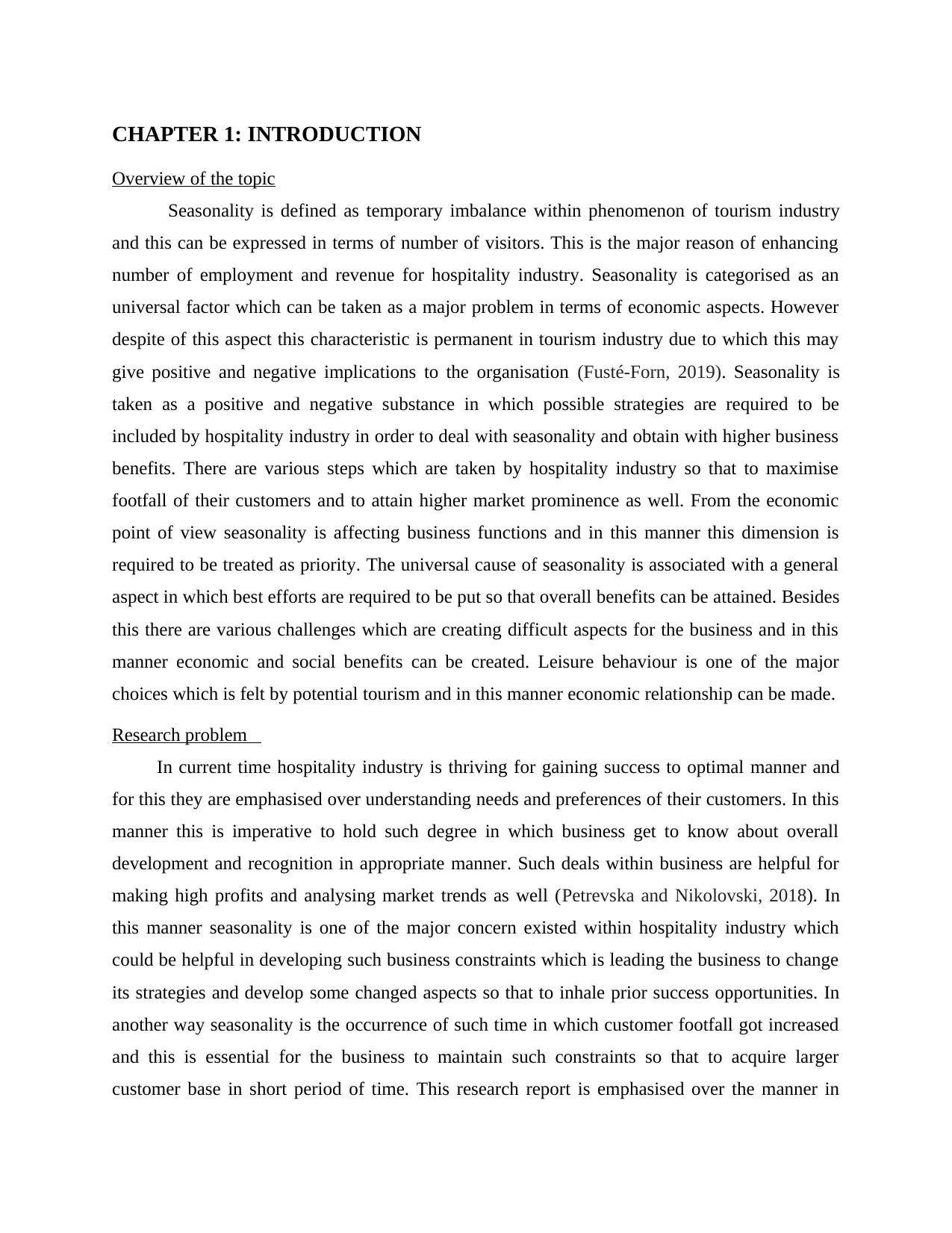
CHAPTER 1: INTRODUCTION
Overview of the topic
Seasonality is defined as temporary imbalance within phenomenon of tourism industry
and this can be expressed in terms of number of visitors. This is the major reason of enhancing
number of employment and revenue for hospitality industry. Seasonality is categorised as an
universal factor which can be taken as a major problem in terms of economic aspects. However
despite of this aspect this characteristic is permanent in tourism industry due to which this may
give positive and negative implications to the organisation (Fusté-Forn, 2019). Seasonality is
taken as a positive and negative substance in which possible strategies are required to be
included by hospitality industry in order to deal with seasonality and obtain with higher business
benefits. There are various steps which are taken by hospitality industry so that to maximise
footfall of their customers and to attain higher market prominence as well. From the economic
point of view seasonality is affecting business functions and in this manner this dimension is
required to be treated as priority. The universal cause of seasonality is associated with a general
aspect in which best efforts are required to be put so that overall benefits can be attained. Besides
this there are various challenges which are creating difficult aspects for the business and in this
manner economic and social benefits can be created. Leisure behaviour is one of the major
choices which is felt by potential tourism and in this manner economic relationship can be made.
Research problem
In current time hospitality industry is thriving for gaining success to optimal manner and
for this they are emphasised over understanding needs and preferences of their customers. In this
manner this is imperative to hold such degree in which business get to know about overall
development and recognition in appropriate manner. Such deals within business are helpful for
making high profits and analysing market trends as well (Petrevska and Nikolovski, 2018). In
this manner seasonality is one of the major concern existed within hospitality industry which
could be helpful in developing such business constraints which is leading the business to change
its strategies and develop some changed aspects so that to inhale prior success opportunities. In
another way seasonality is the occurrence of such time in which customer footfall got increased
and this is essential for the business to maintain such constraints so that to acquire larger
customer base in short period of time. This research report is emphasised over the manner in
Overview of the topic
Seasonality is defined as temporary imbalance within phenomenon of tourism industry
and this can be expressed in terms of number of visitors. This is the major reason of enhancing
number of employment and revenue for hospitality industry. Seasonality is categorised as an
universal factor which can be taken as a major problem in terms of economic aspects. However
despite of this aspect this characteristic is permanent in tourism industry due to which this may
give positive and negative implications to the organisation (Fusté-Forn, 2019). Seasonality is
taken as a positive and negative substance in which possible strategies are required to be
included by hospitality industry in order to deal with seasonality and obtain with higher business
benefits. There are various steps which are taken by hospitality industry so that to maximise
footfall of their customers and to attain higher market prominence as well. From the economic
point of view seasonality is affecting business functions and in this manner this dimension is
required to be treated as priority. The universal cause of seasonality is associated with a general
aspect in which best efforts are required to be put so that overall benefits can be attained. Besides
this there are various challenges which are creating difficult aspects for the business and in this
manner economic and social benefits can be created. Leisure behaviour is one of the major
choices which is felt by potential tourism and in this manner economic relationship can be made.
Research problem
In current time hospitality industry is thriving for gaining success to optimal manner and
for this they are emphasised over understanding needs and preferences of their customers. In this
manner this is imperative to hold such degree in which business get to know about overall
development and recognition in appropriate manner. Such deals within business are helpful for
making high profits and analysing market trends as well (Petrevska and Nikolovski, 2018). In
this manner seasonality is one of the major concern existed within hospitality industry which
could be helpful in developing such business constraints which is leading the business to change
its strategies and develop some changed aspects so that to inhale prior success opportunities. In
another way seasonality is the occurrence of such time in which customer footfall got increased
and this is essential for the business to maintain such constraints so that to acquire larger
customer base in short period of time. This research report is emphasised over the manner in
⊘ This is a preview!⊘
Do you want full access?
Subscribe today to unlock all pages.

Trusted by 1+ million students worldwide
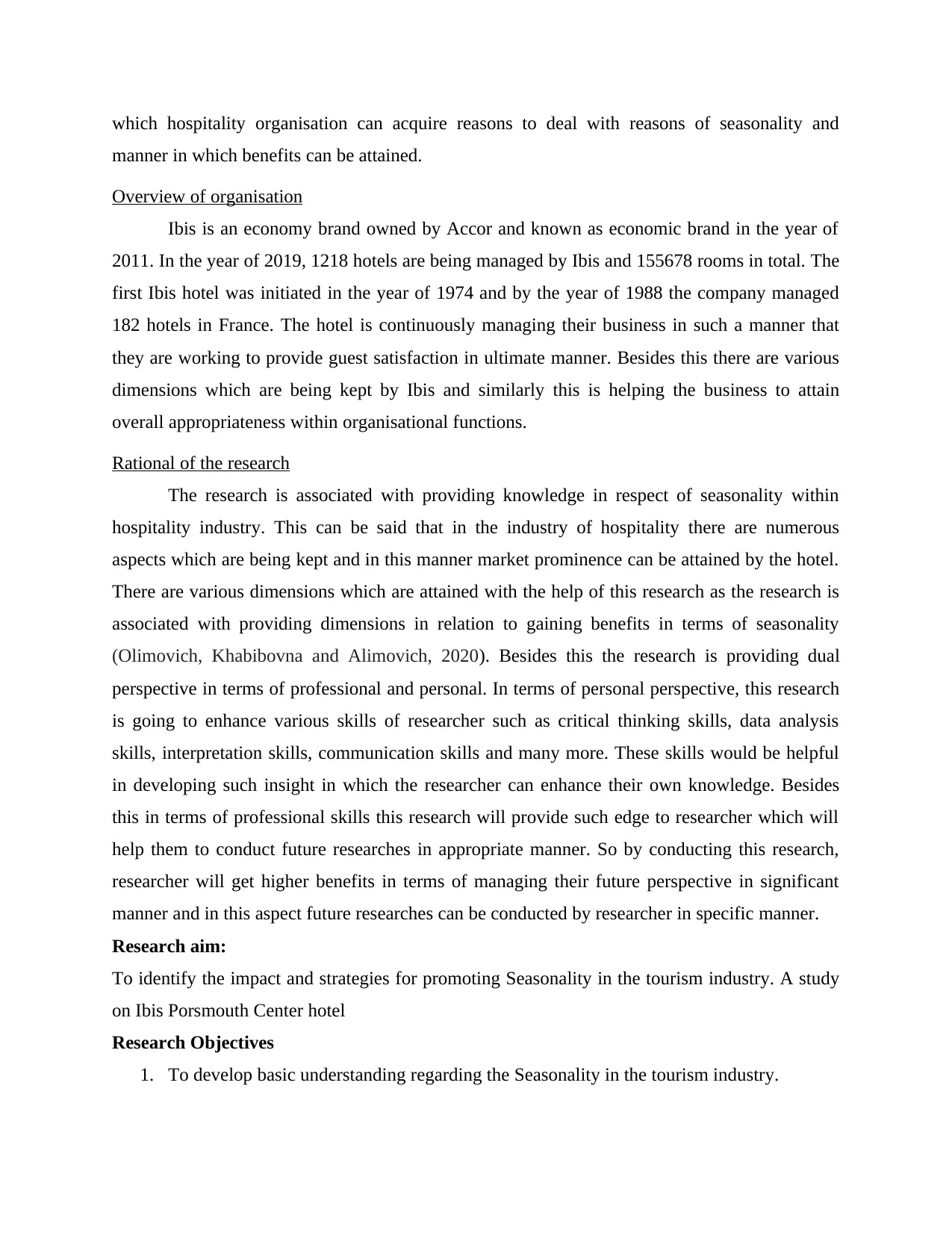
which hospitality organisation can acquire reasons to deal with reasons of seasonality and
manner in which benefits can be attained.
Overview of organisation
Ibis is an economy brand owned by Accor and known as economic brand in the year of
2011. In the year of 2019, 1218 hotels are being managed by Ibis and 155678 rooms in total. The
first Ibis hotel was initiated in the year of 1974 and by the year of 1988 the company managed
182 hotels in France. The hotel is continuously managing their business in such a manner that
they are working to provide guest satisfaction in ultimate manner. Besides this there are various
dimensions which are being kept by Ibis and similarly this is helping the business to attain
overall appropriateness within organisational functions.
Rational of the research
The research is associated with providing knowledge in respect of seasonality within
hospitality industry. This can be said that in the industry of hospitality there are numerous
aspects which are being kept and in this manner market prominence can be attained by the hotel.
There are various dimensions which are attained with the help of this research as the research is
associated with providing dimensions in relation to gaining benefits in terms of seasonality
(Olimovich, Khabibovna and Alimovich, 2020). Besides this the research is providing dual
perspective in terms of professional and personal. In terms of personal perspective, this research
is going to enhance various skills of researcher such as critical thinking skills, data analysis
skills, interpretation skills, communication skills and many more. These skills would be helpful
in developing such insight in which the researcher can enhance their own knowledge. Besides
this in terms of professional skills this research will provide such edge to researcher which will
help them to conduct future researches in appropriate manner. So by conducting this research,
researcher will get higher benefits in terms of managing their future perspective in significant
manner and in this aspect future researches can be conducted by researcher in specific manner.
Research aim:
To identify the impact and strategies for promoting Seasonality in the tourism industry. A study
on Ibis Porsmouth Center hotel
Research Objectives
1. To develop basic understanding regarding the Seasonality in the tourism industry.
manner in which benefits can be attained.
Overview of organisation
Ibis is an economy brand owned by Accor and known as economic brand in the year of
2011. In the year of 2019, 1218 hotels are being managed by Ibis and 155678 rooms in total. The
first Ibis hotel was initiated in the year of 1974 and by the year of 1988 the company managed
182 hotels in France. The hotel is continuously managing their business in such a manner that
they are working to provide guest satisfaction in ultimate manner. Besides this there are various
dimensions which are being kept by Ibis and similarly this is helping the business to attain
overall appropriateness within organisational functions.
Rational of the research
The research is associated with providing knowledge in respect of seasonality within
hospitality industry. This can be said that in the industry of hospitality there are numerous
aspects which are being kept and in this manner market prominence can be attained by the hotel.
There are various dimensions which are attained with the help of this research as the research is
associated with providing dimensions in relation to gaining benefits in terms of seasonality
(Olimovich, Khabibovna and Alimovich, 2020). Besides this the research is providing dual
perspective in terms of professional and personal. In terms of personal perspective, this research
is going to enhance various skills of researcher such as critical thinking skills, data analysis
skills, interpretation skills, communication skills and many more. These skills would be helpful
in developing such insight in which the researcher can enhance their own knowledge. Besides
this in terms of professional skills this research will provide such edge to researcher which will
help them to conduct future researches in appropriate manner. So by conducting this research,
researcher will get higher benefits in terms of managing their future perspective in significant
manner and in this aspect future researches can be conducted by researcher in specific manner.
Research aim:
To identify the impact and strategies for promoting Seasonality in the tourism industry. A study
on Ibis Porsmouth Center hotel
Research Objectives
1. To develop basic understanding regarding the Seasonality in the tourism industry.
Paraphrase This Document
Need a fresh take? Get an instant paraphrase of this document with our AI Paraphraser
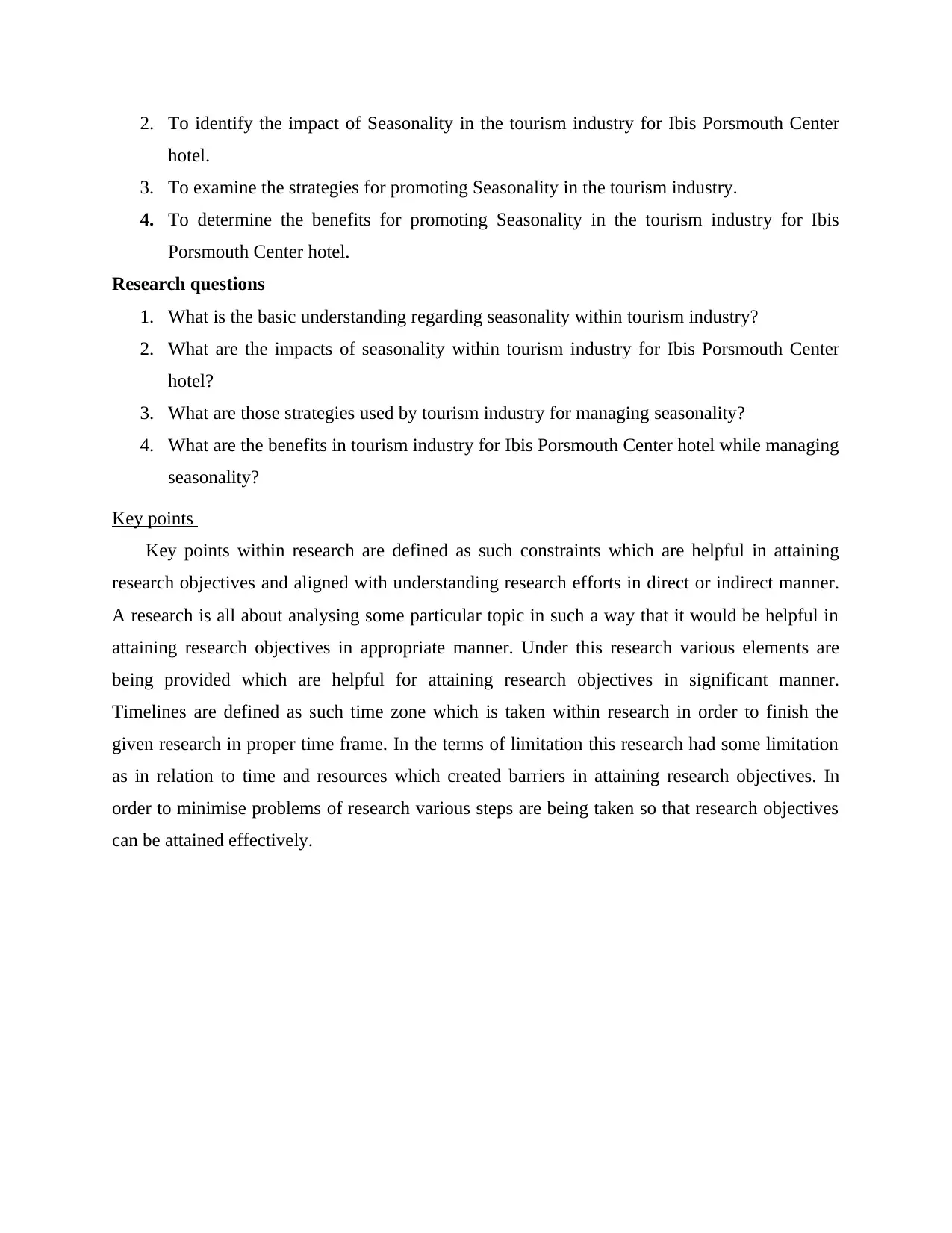
2. To identify the impact of Seasonality in the tourism industry for Ibis Porsmouth Center
hotel.
3. To examine the strategies for promoting Seasonality in the tourism industry.
4. To determine the benefits for promoting Seasonality in the tourism industry for Ibis
Porsmouth Center hotel.
Research questions
1. What is the basic understanding regarding seasonality within tourism industry?
2. What are the impacts of seasonality within tourism industry for Ibis Porsmouth Center
hotel?
3. What are those strategies used by tourism industry for managing seasonality?
4. What are the benefits in tourism industry for Ibis Porsmouth Center hotel while managing
seasonality?
Key points
Key points within research are defined as such constraints which are helpful in attaining
research objectives and aligned with understanding research efforts in direct or indirect manner.
A research is all about analysing some particular topic in such a way that it would be helpful in
attaining research objectives in appropriate manner. Under this research various elements are
being provided which are helpful for attaining research objectives in significant manner.
Timelines are defined as such time zone which is taken within research in order to finish the
given research in proper time frame. In the terms of limitation this research had some limitation
as in relation to time and resources which created barriers in attaining research objectives. In
order to minimise problems of research various steps are being taken so that research objectives
can be attained effectively.
hotel.
3. To examine the strategies for promoting Seasonality in the tourism industry.
4. To determine the benefits for promoting Seasonality in the tourism industry for Ibis
Porsmouth Center hotel.
Research questions
1. What is the basic understanding regarding seasonality within tourism industry?
2. What are the impacts of seasonality within tourism industry for Ibis Porsmouth Center
hotel?
3. What are those strategies used by tourism industry for managing seasonality?
4. What are the benefits in tourism industry for Ibis Porsmouth Center hotel while managing
seasonality?
Key points
Key points within research are defined as such constraints which are helpful in attaining
research objectives and aligned with understanding research efforts in direct or indirect manner.
A research is all about analysing some particular topic in such a way that it would be helpful in
attaining research objectives in appropriate manner. Under this research various elements are
being provided which are helpful for attaining research objectives in significant manner.
Timelines are defined as such time zone which is taken within research in order to finish the
given research in proper time frame. In the terms of limitation this research had some limitation
as in relation to time and resources which created barriers in attaining research objectives. In
order to minimise problems of research various steps are being taken so that research objectives
can be attained effectively.
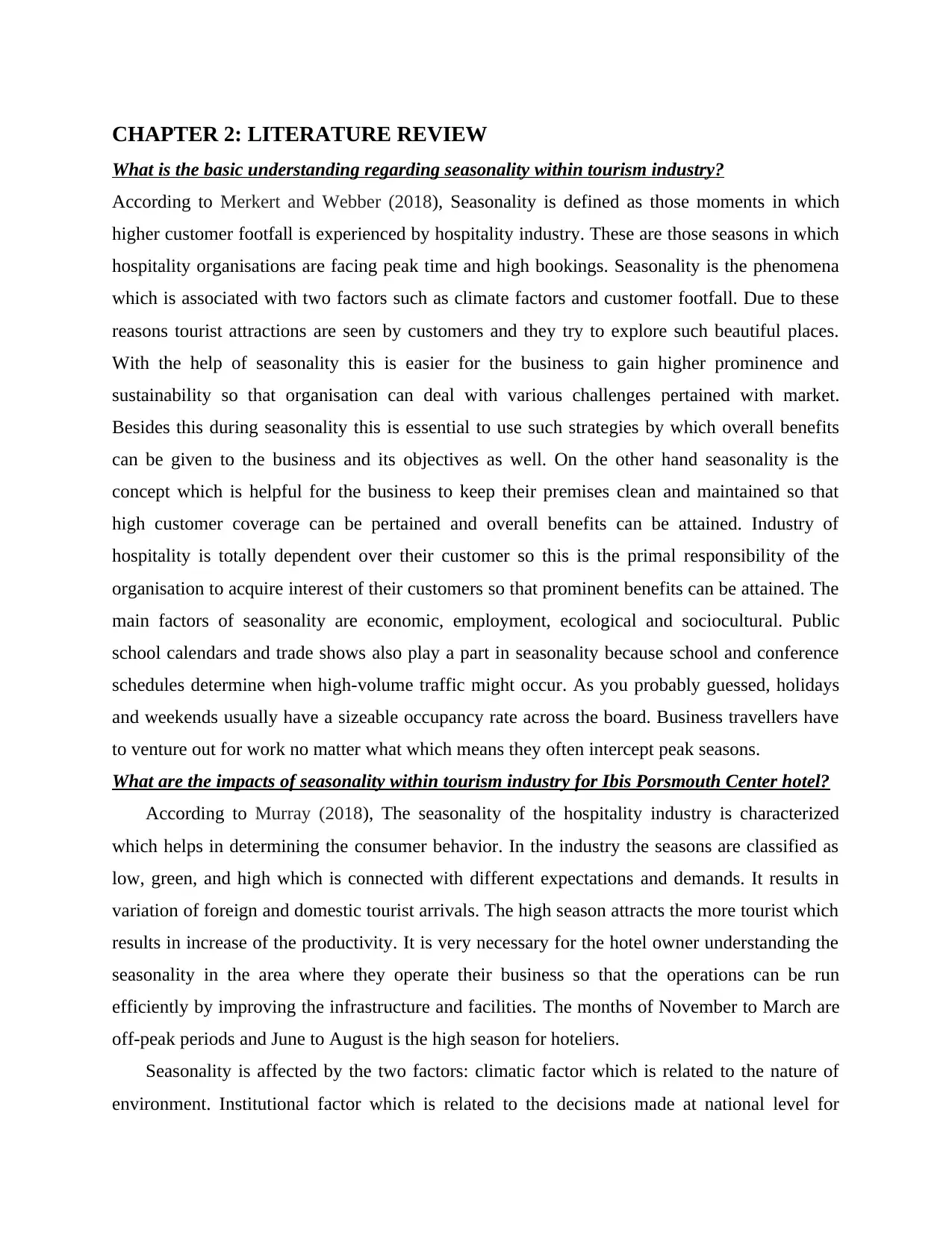
CHAPTER 2: LITERATURE REVIEW
What is the basic understanding regarding seasonality within tourism industry?
According to Merkert and Webber (2018), Seasonality is defined as those moments in which
higher customer footfall is experienced by hospitality industry. These are those seasons in which
hospitality organisations are facing peak time and high bookings. Seasonality is the phenomena
which is associated with two factors such as climate factors and customer footfall. Due to these
reasons tourist attractions are seen by customers and they try to explore such beautiful places.
With the help of seasonality this is easier for the business to gain higher prominence and
sustainability so that organisation can deal with various challenges pertained with market.
Besides this during seasonality this is essential to use such strategies by which overall benefits
can be given to the business and its objectives as well. On the other hand seasonality is the
concept which is helpful for the business to keep their premises clean and maintained so that
high customer coverage can be pertained and overall benefits can be attained. Industry of
hospitality is totally dependent over their customer so this is the primal responsibility of the
organisation to acquire interest of their customers so that prominent benefits can be attained. The
main factors of seasonality are economic, employment, ecological and sociocultural. Public
school calendars and trade shows also play a part in seasonality because school and conference
schedules determine when high-volume traffic might occur. As you probably guessed, holidays
and weekends usually have a sizeable occupancy rate across the board. Business travellers have
to venture out for work no matter what which means they often intercept peak seasons.
What are the impacts of seasonality within tourism industry for Ibis Porsmouth Center hotel?
According to Murray (2018), The seasonality of the hospitality industry is characterized
which helps in determining the consumer behavior. In the industry the seasons are classified as
low, green, and high which is connected with different expectations and demands. It results in
variation of foreign and domestic tourist arrivals. The high season attracts the more tourist which
results in increase of the productivity. It is very necessary for the hotel owner understanding the
seasonality in the area where they operate their business so that the operations can be run
efficiently by improving the infrastructure and facilities. The months of November to March are
off-peak periods and June to August is the high season for hoteliers.
Seasonality is affected by the two factors: climatic factor which is related to the nature of
environment. Institutional factor which is related to the decisions made at national level for
What is the basic understanding regarding seasonality within tourism industry?
According to Merkert and Webber (2018), Seasonality is defined as those moments in which
higher customer footfall is experienced by hospitality industry. These are those seasons in which
hospitality organisations are facing peak time and high bookings. Seasonality is the phenomena
which is associated with two factors such as climate factors and customer footfall. Due to these
reasons tourist attractions are seen by customers and they try to explore such beautiful places.
With the help of seasonality this is easier for the business to gain higher prominence and
sustainability so that organisation can deal with various challenges pertained with market.
Besides this during seasonality this is essential to use such strategies by which overall benefits
can be given to the business and its objectives as well. On the other hand seasonality is the
concept which is helpful for the business to keep their premises clean and maintained so that
high customer coverage can be pertained and overall benefits can be attained. Industry of
hospitality is totally dependent over their customer so this is the primal responsibility of the
organisation to acquire interest of their customers so that prominent benefits can be attained. The
main factors of seasonality are economic, employment, ecological and sociocultural. Public
school calendars and trade shows also play a part in seasonality because school and conference
schedules determine when high-volume traffic might occur. As you probably guessed, holidays
and weekends usually have a sizeable occupancy rate across the board. Business travellers have
to venture out for work no matter what which means they often intercept peak seasons.
What are the impacts of seasonality within tourism industry for Ibis Porsmouth Center hotel?
According to Murray (2018), The seasonality of the hospitality industry is characterized
which helps in determining the consumer behavior. In the industry the seasons are classified as
low, green, and high which is connected with different expectations and demands. It results in
variation of foreign and domestic tourist arrivals. The high season attracts the more tourist which
results in increase of the productivity. It is very necessary for the hotel owner understanding the
seasonality in the area where they operate their business so that the operations can be run
efficiently by improving the infrastructure and facilities. The months of November to March are
off-peak periods and June to August is the high season for hoteliers.
Seasonality is affected by the two factors: climatic factor which is related to the nature of
environment. Institutional factor which is related to the decisions made at national level for
⊘ This is a preview!⊘
Do you want full access?
Subscribe today to unlock all pages.

Trusted by 1+ million students worldwide
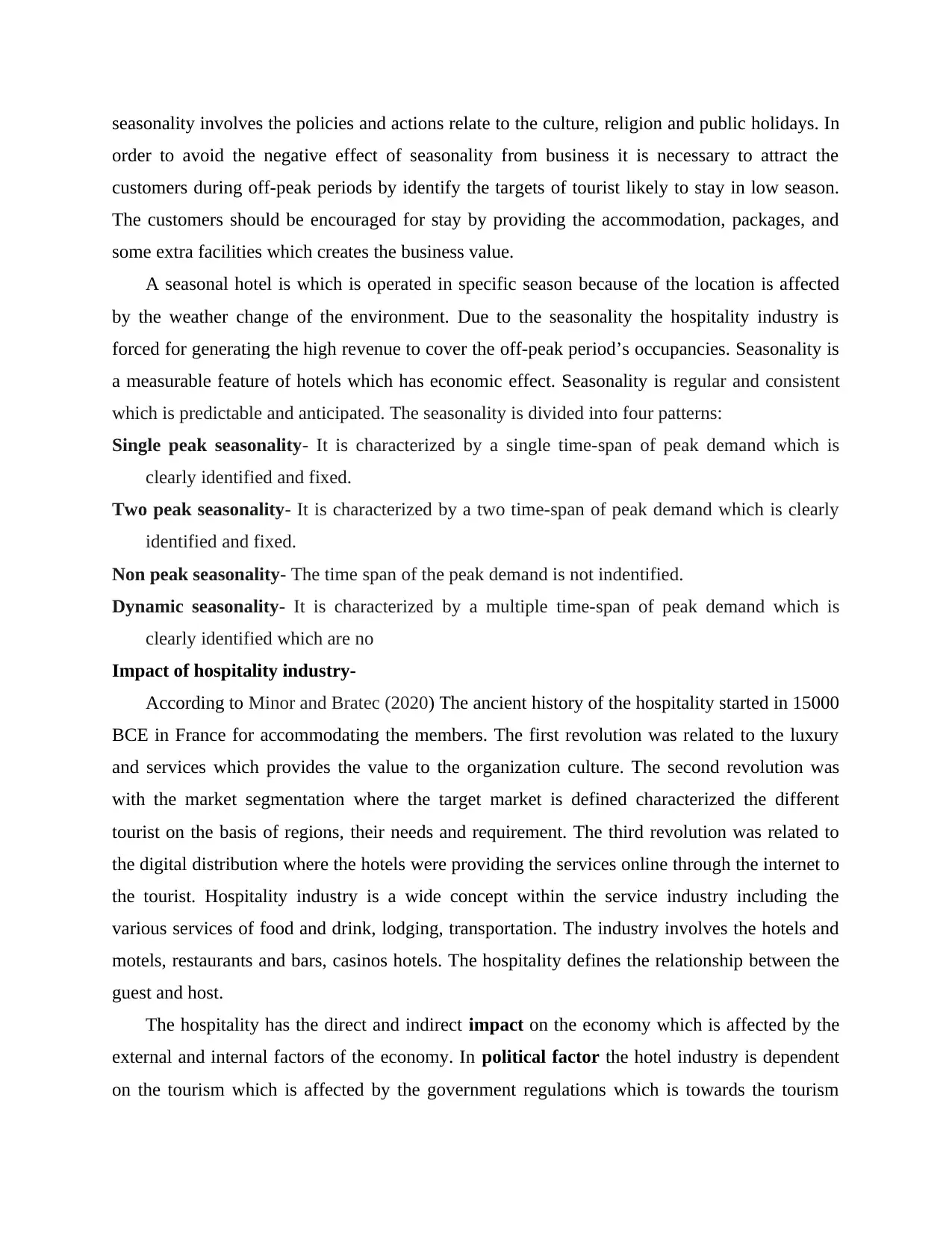
seasonality involves the policies and actions relate to the culture, religion and public holidays. In
order to avoid the negative effect of seasonality from business it is necessary to attract the
customers during off-peak periods by identify the targets of tourist likely to stay in low season.
The customers should be encouraged for stay by providing the accommodation, packages, and
some extra facilities which creates the business value.
A seasonal hotel is which is operated in specific season because of the location is affected
by the weather change of the environment. Due to the seasonality the hospitality industry is
forced for generating the high revenue to cover the off-peak period’s occupancies. Seasonality is
a measurable feature of hotels which has economic effect. Seasonality is regular and consistent
which is predictable and anticipated. The seasonality is divided into four patterns:
Single peak seasonality- It is characterized by a single time-span of peak demand which is
clearly identified and fixed.
Two peak seasonality- It is characterized by a two time-span of peak demand which is clearly
identified and fixed.
Non peak seasonality- The time span of the peak demand is not indentified.
Dynamic seasonality- It is characterized by a multiple time-span of peak demand which is
clearly identified which are no
Impact of hospitality industry-
According to Minor and Bratec (2020) The ancient history of the hospitality started in 15000
BCE in France for accommodating the members. The first revolution was related to the luxury
and services which provides the value to the organization culture. The second revolution was
with the market segmentation where the target market is defined characterized the different
tourist on the basis of regions, their needs and requirement. The third revolution was related to
the digital distribution where the hotels were providing the services online through the internet to
the tourist. Hospitality industry is a wide concept within the service industry including the
various services of food and drink, lodging, transportation. The industry involves the hotels and
motels, restaurants and bars, casinos hotels. The hospitality defines the relationship between the
guest and host.
The hospitality has the direct and indirect impact on the economy which is affected by the
external and internal factors of the economy. In political factor the hotel industry is dependent
on the tourism which is affected by the government regulations which is towards the tourism
order to avoid the negative effect of seasonality from business it is necessary to attract the
customers during off-peak periods by identify the targets of tourist likely to stay in low season.
The customers should be encouraged for stay by providing the accommodation, packages, and
some extra facilities which creates the business value.
A seasonal hotel is which is operated in specific season because of the location is affected
by the weather change of the environment. Due to the seasonality the hospitality industry is
forced for generating the high revenue to cover the off-peak period’s occupancies. Seasonality is
a measurable feature of hotels which has economic effect. Seasonality is regular and consistent
which is predictable and anticipated. The seasonality is divided into four patterns:
Single peak seasonality- It is characterized by a single time-span of peak demand which is
clearly identified and fixed.
Two peak seasonality- It is characterized by a two time-span of peak demand which is clearly
identified and fixed.
Non peak seasonality- The time span of the peak demand is not indentified.
Dynamic seasonality- It is characterized by a multiple time-span of peak demand which is
clearly identified which are no
Impact of hospitality industry-
According to Minor and Bratec (2020) The ancient history of the hospitality started in 15000
BCE in France for accommodating the members. The first revolution was related to the luxury
and services which provides the value to the organization culture. The second revolution was
with the market segmentation where the target market is defined characterized the different
tourist on the basis of regions, their needs and requirement. The third revolution was related to
the digital distribution where the hotels were providing the services online through the internet to
the tourist. Hospitality industry is a wide concept within the service industry including the
various services of food and drink, lodging, transportation. The industry involves the hotels and
motels, restaurants and bars, casinos hotels. The hospitality defines the relationship between the
guest and host.
The hospitality has the direct and indirect impact on the economy which is affected by the
external and internal factors of the economy. In political factor the hotel industry is dependent
on the tourism which is affected by the government regulations which is towards the tourism
Paraphrase This Document
Need a fresh take? Get an instant paraphrase of this document with our AI Paraphraser
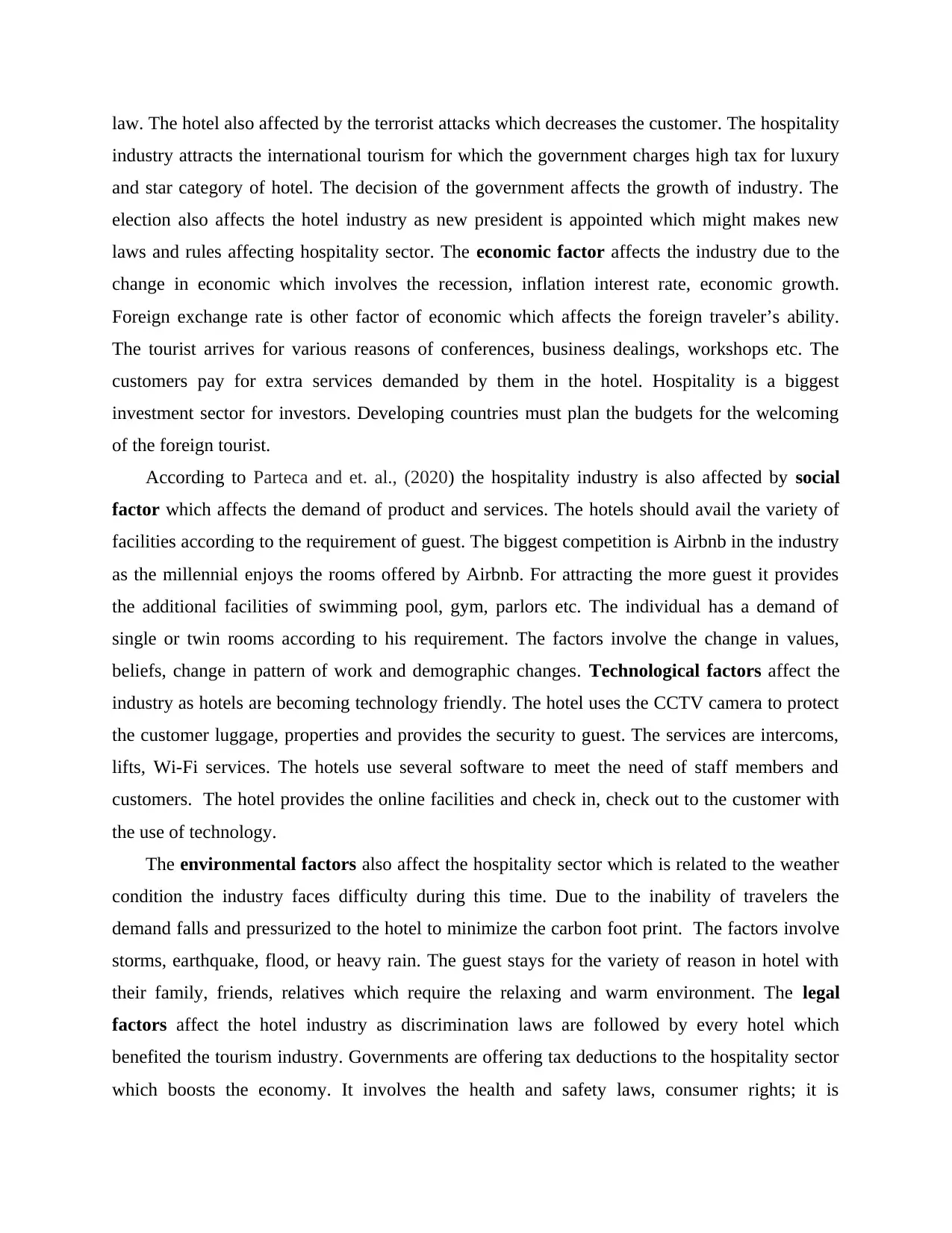
law. The hotel also affected by the terrorist attacks which decreases the customer. The hospitality
industry attracts the international tourism for which the government charges high tax for luxury
and star category of hotel. The decision of the government affects the growth of industry. The
election also affects the hotel industry as new president is appointed which might makes new
laws and rules affecting hospitality sector. The economic factor affects the industry due to the
change in economic which involves the recession, inflation interest rate, economic growth.
Foreign exchange rate is other factor of economic which affects the foreign traveler’s ability.
The tourist arrives for various reasons of conferences, business dealings, workshops etc. The
customers pay for extra services demanded by them in the hotel. Hospitality is a biggest
investment sector for investors. Developing countries must plan the budgets for the welcoming
of the foreign tourist.
According to Parteca and et. al., (2020) the hospitality industry is also affected by social
factor which affects the demand of product and services. The hotels should avail the variety of
facilities according to the requirement of guest. The biggest competition is Airbnb in the industry
as the millennial enjoys the rooms offered by Airbnb. For attracting the more guest it provides
the additional facilities of swimming pool, gym, parlors etc. The individual has a demand of
single or twin rooms according to his requirement. The factors involve the change in values,
beliefs, change in pattern of work and demographic changes. Technological factors affect the
industry as hotels are becoming technology friendly. The hotel uses the CCTV camera to protect
the customer luggage, properties and provides the security to guest. The services are intercoms,
lifts, Wi-Fi services. The hotels use several software to meet the need of staff members and
customers. The hotel provides the online facilities and check in, check out to the customer with
the use of technology.
The environmental factors also affect the hospitality sector which is related to the weather
condition the industry faces difficulty during this time. Due to the inability of travelers the
demand falls and pressurized to the hotel to minimize the carbon foot print. The factors involve
storms, earthquake, flood, or heavy rain. The guest stays for the variety of reason in hotel with
their family, friends, relatives which require the relaxing and warm environment. The legal
factors affect the hotel industry as discrimination laws are followed by every hotel which
benefited the tourism industry. Governments are offering tax deductions to the hospitality sector
which boosts the economy. It involves the health and safety laws, consumer rights; it is
industry attracts the international tourism for which the government charges high tax for luxury
and star category of hotel. The decision of the government affects the growth of industry. The
election also affects the hotel industry as new president is appointed which might makes new
laws and rules affecting hospitality sector. The economic factor affects the industry due to the
change in economic which involves the recession, inflation interest rate, economic growth.
Foreign exchange rate is other factor of economic which affects the foreign traveler’s ability.
The tourist arrives for various reasons of conferences, business dealings, workshops etc. The
customers pay for extra services demanded by them in the hotel. Hospitality is a biggest
investment sector for investors. Developing countries must plan the budgets for the welcoming
of the foreign tourist.
According to Parteca and et. al., (2020) the hospitality industry is also affected by social
factor which affects the demand of product and services. The hotels should avail the variety of
facilities according to the requirement of guest. The biggest competition is Airbnb in the industry
as the millennial enjoys the rooms offered by Airbnb. For attracting the more guest it provides
the additional facilities of swimming pool, gym, parlors etc. The individual has a demand of
single or twin rooms according to his requirement. The factors involve the change in values,
beliefs, change in pattern of work and demographic changes. Technological factors affect the
industry as hotels are becoming technology friendly. The hotel uses the CCTV camera to protect
the customer luggage, properties and provides the security to guest. The services are intercoms,
lifts, Wi-Fi services. The hotels use several software to meet the need of staff members and
customers. The hotel provides the online facilities and check in, check out to the customer with
the use of technology.
The environmental factors also affect the hospitality sector which is related to the weather
condition the industry faces difficulty during this time. Due to the inability of travelers the
demand falls and pressurized to the hotel to minimize the carbon foot print. The factors involve
storms, earthquake, flood, or heavy rain. The guest stays for the variety of reason in hotel with
their family, friends, relatives which require the relaxing and warm environment. The legal
factors affect the hotel industry as discrimination laws are followed by every hotel which
benefited the tourism industry. Governments are offering tax deductions to the hospitality sector
which boosts the economy. It involves the health and safety laws, consumer rights; it is
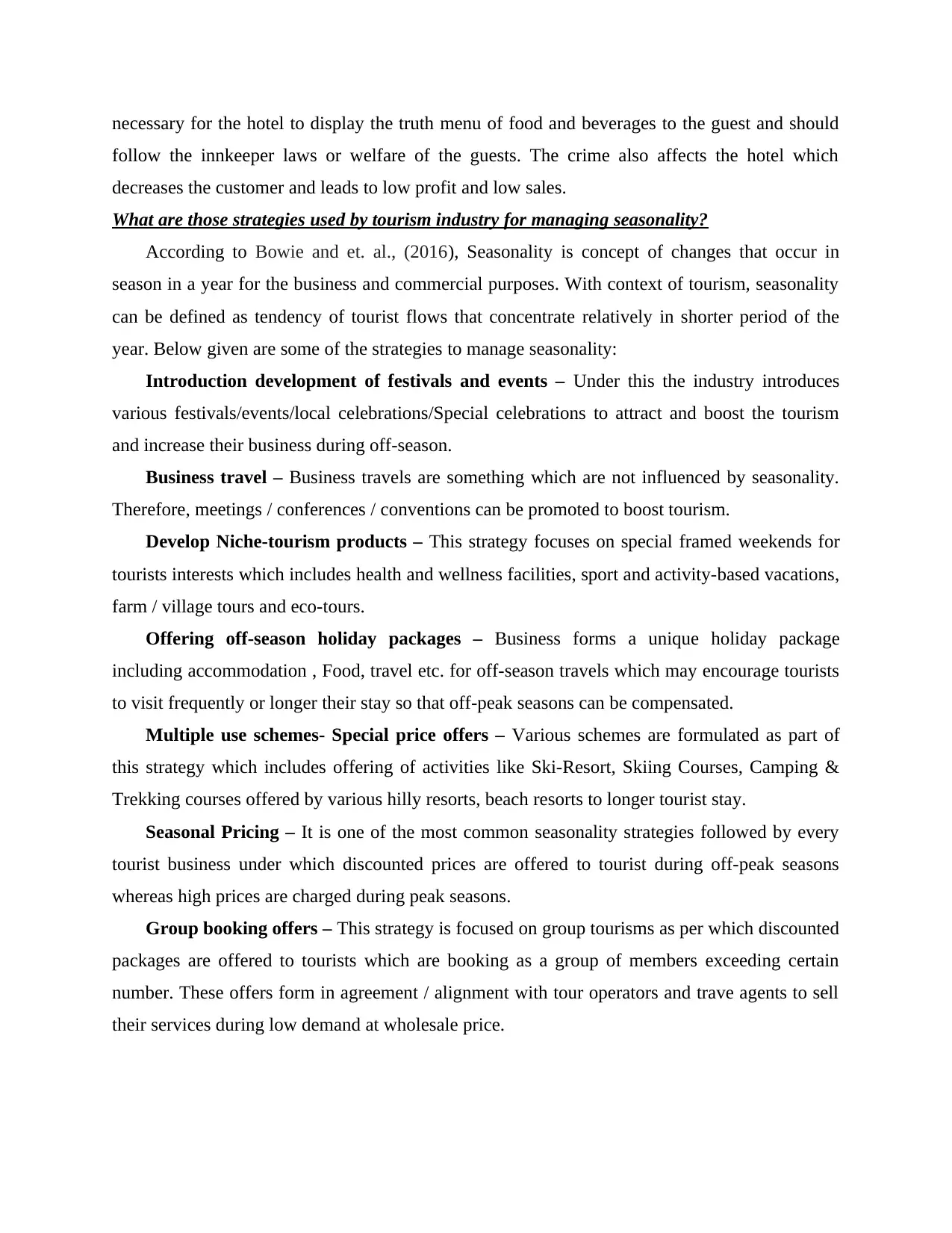
necessary for the hotel to display the truth menu of food and beverages to the guest and should
follow the innkeeper laws or welfare of the guests. The crime also affects the hotel which
decreases the customer and leads to low profit and low sales.
What are those strategies used by tourism industry for managing seasonality?
According to Bowie and et. al., (2016), Seasonality is concept of changes that occur in
season in a year for the business and commercial purposes. With context of tourism, seasonality
can be defined as tendency of tourist flows that concentrate relatively in shorter period of the
year. Below given are some of the strategies to manage seasonality:
Introduction development of festivals and events – Under this the industry introduces
various festivals/events/local celebrations/Special celebrations to attract and boost the tourism
and increase their business during off-season.
Business travel – Business travels are something which are not influenced by seasonality.
Therefore, meetings / conferences / conventions can be promoted to boost tourism.
Develop Niche-tourism products – This strategy focuses on special framed weekends for
tourists interests which includes health and wellness facilities, sport and activity-based vacations,
farm / village tours and eco-tours.
Offering off-season holiday packages – Business forms a unique holiday package
including accommodation , Food, travel etc. for off-season travels which may encourage tourists
to visit frequently or longer their stay so that off-peak seasons can be compensated.
Multiple use schemes- Special price offers – Various schemes are formulated as part of
this strategy which includes offering of activities like Ski-Resort, Skiing Courses, Camping &
Trekking courses offered by various hilly resorts, beach resorts to longer tourist stay.
Seasonal Pricing – It is one of the most common seasonality strategies followed by every
tourist business under which discounted prices are offered to tourist during off-peak seasons
whereas high prices are charged during peak seasons.
Group booking offers – This strategy is focused on group tourisms as per which discounted
packages are offered to tourists which are booking as a group of members exceeding certain
number. These offers form in agreement / alignment with tour operators and trave agents to sell
their services during low demand at wholesale price.
follow the innkeeper laws or welfare of the guests. The crime also affects the hotel which
decreases the customer and leads to low profit and low sales.
What are those strategies used by tourism industry for managing seasonality?
According to Bowie and et. al., (2016), Seasonality is concept of changes that occur in
season in a year for the business and commercial purposes. With context of tourism, seasonality
can be defined as tendency of tourist flows that concentrate relatively in shorter period of the
year. Below given are some of the strategies to manage seasonality:
Introduction development of festivals and events – Under this the industry introduces
various festivals/events/local celebrations/Special celebrations to attract and boost the tourism
and increase their business during off-season.
Business travel – Business travels are something which are not influenced by seasonality.
Therefore, meetings / conferences / conventions can be promoted to boost tourism.
Develop Niche-tourism products – This strategy focuses on special framed weekends for
tourists interests which includes health and wellness facilities, sport and activity-based vacations,
farm / village tours and eco-tours.
Offering off-season holiday packages – Business forms a unique holiday package
including accommodation , Food, travel etc. for off-season travels which may encourage tourists
to visit frequently or longer their stay so that off-peak seasons can be compensated.
Multiple use schemes- Special price offers – Various schemes are formulated as part of
this strategy which includes offering of activities like Ski-Resort, Skiing Courses, Camping &
Trekking courses offered by various hilly resorts, beach resorts to longer tourist stay.
Seasonal Pricing – It is one of the most common seasonality strategies followed by every
tourist business under which discounted prices are offered to tourist during off-peak seasons
whereas high prices are charged during peak seasons.
Group booking offers – This strategy is focused on group tourisms as per which discounted
packages are offered to tourists which are booking as a group of members exceeding certain
number. These offers form in agreement / alignment with tour operators and trave agents to sell
their services during low demand at wholesale price.
⊘ This is a preview!⊘
Do you want full access?
Subscribe today to unlock all pages.

Trusted by 1+ million students worldwide
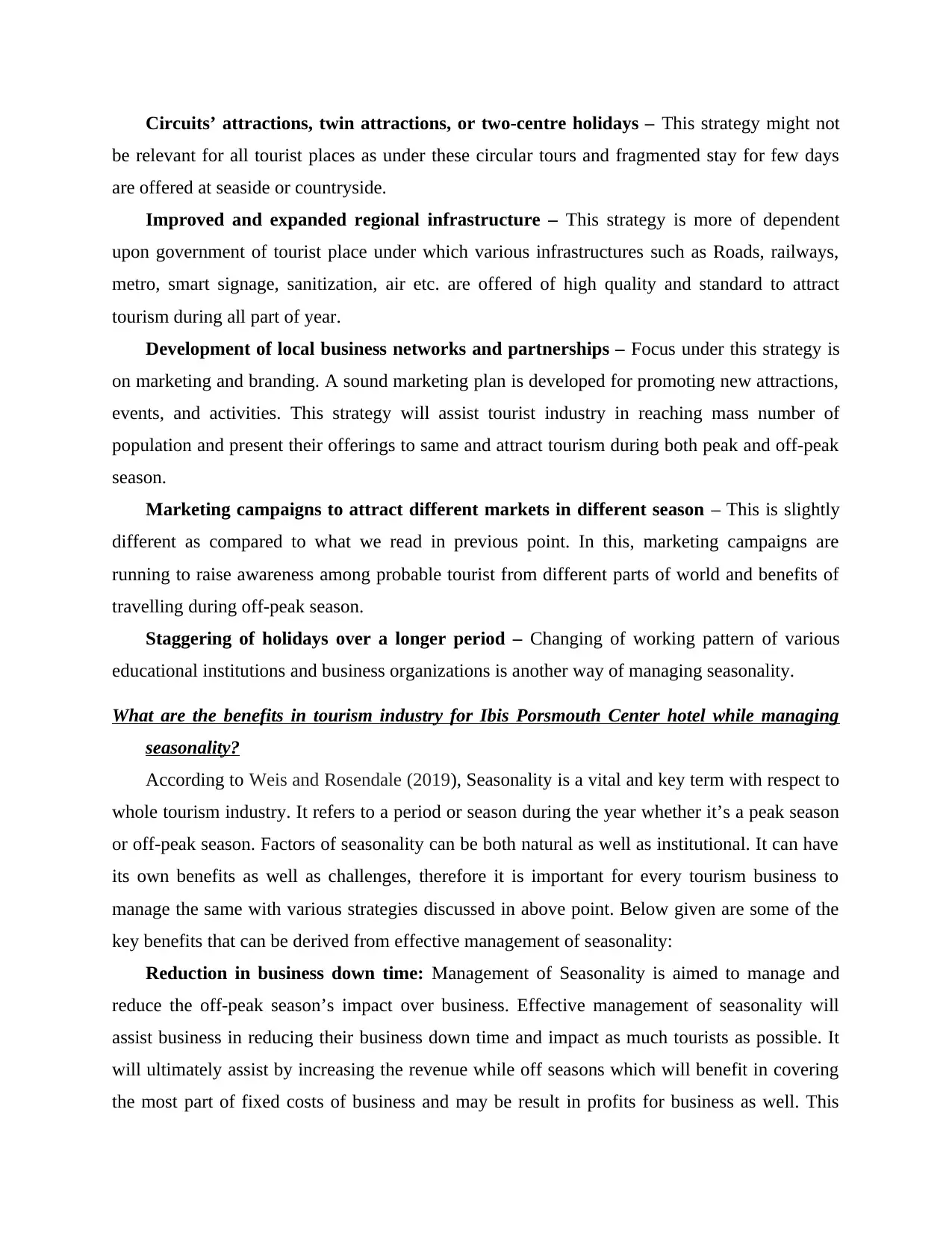
Circuits’ attractions, twin attractions, or two-centre holidays – This strategy might not
be relevant for all tourist places as under these circular tours and fragmented stay for few days
are offered at seaside or countryside.
Improved and expanded regional infrastructure – This strategy is more of dependent
upon government of tourist place under which various infrastructures such as Roads, railways,
metro, smart signage, sanitization, air etc. are offered of high quality and standard to attract
tourism during all part of year.
Development of local business networks and partnerships – Focus under this strategy is
on marketing and branding. A sound marketing plan is developed for promoting new attractions,
events, and activities. This strategy will assist tourist industry in reaching mass number of
population and present their offerings to same and attract tourism during both peak and off-peak
season.
Marketing campaigns to attract different markets in different season – This is slightly
different as compared to what we read in previous point. In this, marketing campaigns are
running to raise awareness among probable tourist from different parts of world and benefits of
travelling during off-peak season.
Staggering of holidays over a longer period – Changing of working pattern of various
educational institutions and business organizations is another way of managing seasonality.
What are the benefits in tourism industry for Ibis Porsmouth Center hotel while managing
seasonality?
According to Weis and Rosendale (2019), Seasonality is a vital and key term with respect to
whole tourism industry. It refers to a period or season during the year whether it’s a peak season
or off-peak season. Factors of seasonality can be both natural as well as institutional. It can have
its own benefits as well as challenges, therefore it is important for every tourism business to
manage the same with various strategies discussed in above point. Below given are some of the
key benefits that can be derived from effective management of seasonality:
Reduction in business down time: Management of Seasonality is aimed to manage and
reduce the off-peak season’s impact over business. Effective management of seasonality will
assist business in reducing their business down time and impact as much tourists as possible. It
will ultimately assist by increasing the revenue while off seasons which will benefit in covering
the most part of fixed costs of business and may be result in profits for business as well. This
be relevant for all tourist places as under these circular tours and fragmented stay for few days
are offered at seaside or countryside.
Improved and expanded regional infrastructure – This strategy is more of dependent
upon government of tourist place under which various infrastructures such as Roads, railways,
metro, smart signage, sanitization, air etc. are offered of high quality and standard to attract
tourism during all part of year.
Development of local business networks and partnerships – Focus under this strategy is
on marketing and branding. A sound marketing plan is developed for promoting new attractions,
events, and activities. This strategy will assist tourist industry in reaching mass number of
population and present their offerings to same and attract tourism during both peak and off-peak
season.
Marketing campaigns to attract different markets in different season – This is slightly
different as compared to what we read in previous point. In this, marketing campaigns are
running to raise awareness among probable tourist from different parts of world and benefits of
travelling during off-peak season.
Staggering of holidays over a longer period – Changing of working pattern of various
educational institutions and business organizations is another way of managing seasonality.
What are the benefits in tourism industry for Ibis Porsmouth Center hotel while managing
seasonality?
According to Weis and Rosendale (2019), Seasonality is a vital and key term with respect to
whole tourism industry. It refers to a period or season during the year whether it’s a peak season
or off-peak season. Factors of seasonality can be both natural as well as institutional. It can have
its own benefits as well as challenges, therefore it is important for every tourism business to
manage the same with various strategies discussed in above point. Below given are some of the
key benefits that can be derived from effective management of seasonality:
Reduction in business down time: Management of Seasonality is aimed to manage and
reduce the off-peak season’s impact over business. Effective management of seasonality will
assist business in reducing their business down time and impact as much tourists as possible. It
will ultimately assist by increasing the revenue while off seasons which will benefit in covering
the most part of fixed costs of business and may be result in profits for business as well. This
Paraphrase This Document
Need a fresh take? Get an instant paraphrase of this document with our AI Paraphraser
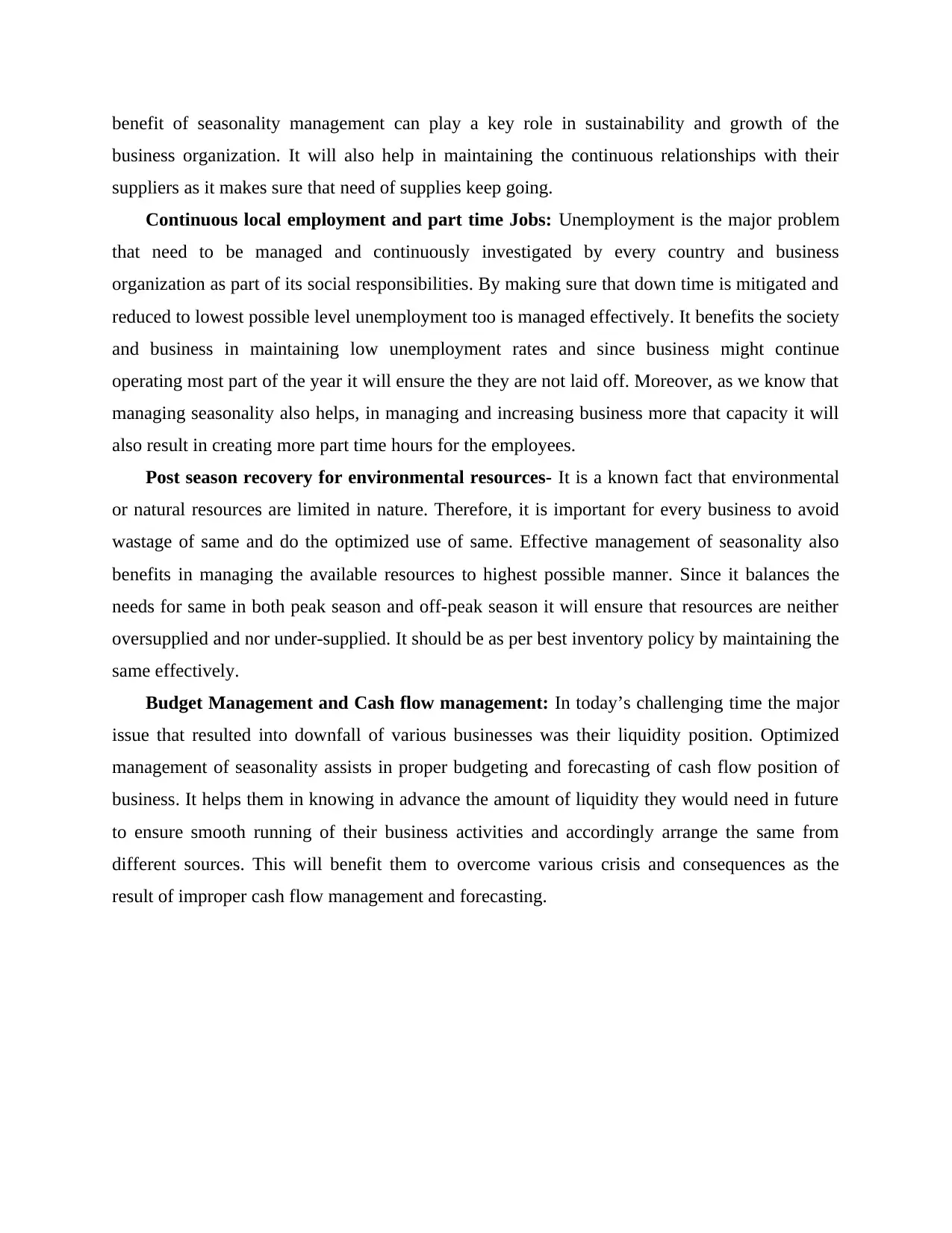
benefit of seasonality management can play a key role in sustainability and growth of the
business organization. It will also help in maintaining the continuous relationships with their
suppliers as it makes sure that need of supplies keep going.
Continuous local employment and part time Jobs: Unemployment is the major problem
that need to be managed and continuously investigated by every country and business
organization as part of its social responsibilities. By making sure that down time is mitigated and
reduced to lowest possible level unemployment too is managed effectively. It benefits the society
and business in maintaining low unemployment rates and since business might continue
operating most part of the year it will ensure the they are not laid off. Moreover, as we know that
managing seasonality also helps, in managing and increasing business more that capacity it will
also result in creating more part time hours for the employees.
Post season recovery for environmental resources- It is a known fact that environmental
or natural resources are limited in nature. Therefore, it is important for every business to avoid
wastage of same and do the optimized use of same. Effective management of seasonality also
benefits in managing the available resources to highest possible manner. Since it balances the
needs for same in both peak season and off-peak season it will ensure that resources are neither
oversupplied and nor under-supplied. It should be as per best inventory policy by maintaining the
same effectively.
Budget Management and Cash flow management: In today’s challenging time the major
issue that resulted into downfall of various businesses was their liquidity position. Optimized
management of seasonality assists in proper budgeting and forecasting of cash flow position of
business. It helps them in knowing in advance the amount of liquidity they would need in future
to ensure smooth running of their business activities and accordingly arrange the same from
different sources. This will benefit them to overcome various crisis and consequences as the
result of improper cash flow management and forecasting.
business organization. It will also help in maintaining the continuous relationships with their
suppliers as it makes sure that need of supplies keep going.
Continuous local employment and part time Jobs: Unemployment is the major problem
that need to be managed and continuously investigated by every country and business
organization as part of its social responsibilities. By making sure that down time is mitigated and
reduced to lowest possible level unemployment too is managed effectively. It benefits the society
and business in maintaining low unemployment rates and since business might continue
operating most part of the year it will ensure the they are not laid off. Moreover, as we know that
managing seasonality also helps, in managing and increasing business more that capacity it will
also result in creating more part time hours for the employees.
Post season recovery for environmental resources- It is a known fact that environmental
or natural resources are limited in nature. Therefore, it is important for every business to avoid
wastage of same and do the optimized use of same. Effective management of seasonality also
benefits in managing the available resources to highest possible manner. Since it balances the
needs for same in both peak season and off-peak season it will ensure that resources are neither
oversupplied and nor under-supplied. It should be as per best inventory policy by maintaining the
same effectively.
Budget Management and Cash flow management: In today’s challenging time the major
issue that resulted into downfall of various businesses was their liquidity position. Optimized
management of seasonality assists in proper budgeting and forecasting of cash flow position of
business. It helps them in knowing in advance the amount of liquidity they would need in future
to ensure smooth running of their business activities and accordingly arrange the same from
different sources. This will benefit them to overcome various crisis and consequences as the
result of improper cash flow management and forecasting.
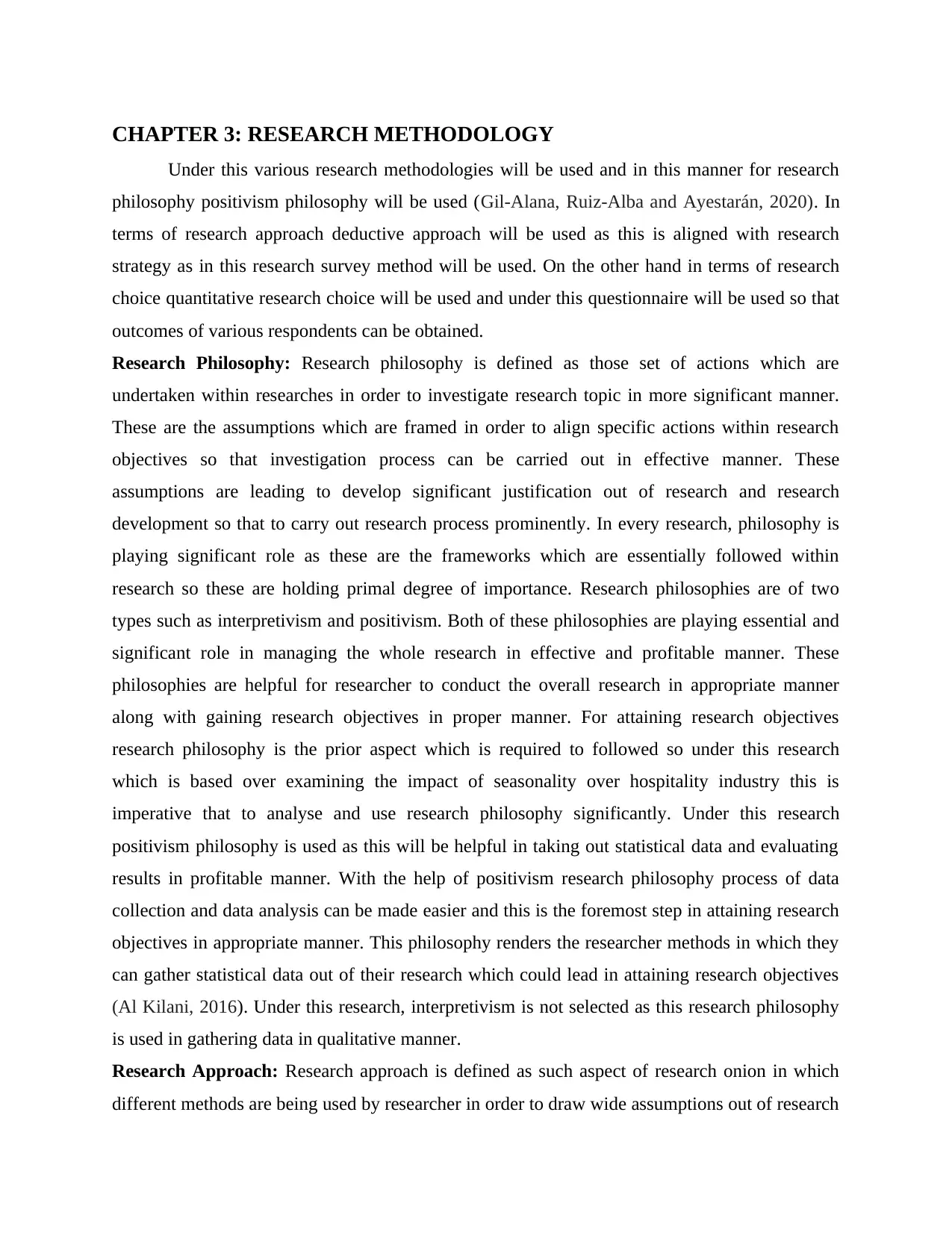
CHAPTER 3: RESEARCH METHODOLOGY
Under this various research methodologies will be used and in this manner for research
philosophy positivism philosophy will be used (Gil-Alana, Ruiz-Alba and Ayestarán, 2020). In
terms of research approach deductive approach will be used as this is aligned with research
strategy as in this research survey method will be used. On the other hand in terms of research
choice quantitative research choice will be used and under this questionnaire will be used so that
outcomes of various respondents can be obtained.
Research Philosophy: Research philosophy is defined as those set of actions which are
undertaken within researches in order to investigate research topic in more significant manner.
These are the assumptions which are framed in order to align specific actions within research
objectives so that investigation process can be carried out in effective manner. These
assumptions are leading to develop significant justification out of research and research
development so that to carry out research process prominently. In every research, philosophy is
playing significant role as these are the frameworks which are essentially followed within
research so these are holding primal degree of importance. Research philosophies are of two
types such as interpretivism and positivism. Both of these philosophies are playing essential and
significant role in managing the whole research in effective and profitable manner. These
philosophies are helpful for researcher to conduct the overall research in appropriate manner
along with gaining research objectives in proper manner. For attaining research objectives
research philosophy is the prior aspect which is required to followed so under this research
which is based over examining the impact of seasonality over hospitality industry this is
imperative that to analyse and use research philosophy significantly. Under this research
positivism philosophy is used as this will be helpful in taking out statistical data and evaluating
results in profitable manner. With the help of positivism research philosophy process of data
collection and data analysis can be made easier and this is the foremost step in attaining research
objectives in appropriate manner. This philosophy renders the researcher methods in which they
can gather statistical data out of their research which could lead in attaining research objectives
(Al Kilani, 2016). Under this research, interpretivism is not selected as this research philosophy
is used in gathering data in qualitative manner.
Research Approach: Research approach is defined as such aspect of research onion in which
different methods are being used by researcher in order to draw wide assumptions out of research
Under this various research methodologies will be used and in this manner for research
philosophy positivism philosophy will be used (Gil-Alana, Ruiz-Alba and Ayestarán, 2020). In
terms of research approach deductive approach will be used as this is aligned with research
strategy as in this research survey method will be used. On the other hand in terms of research
choice quantitative research choice will be used and under this questionnaire will be used so that
outcomes of various respondents can be obtained.
Research Philosophy: Research philosophy is defined as those set of actions which are
undertaken within researches in order to investigate research topic in more significant manner.
These are the assumptions which are framed in order to align specific actions within research
objectives so that investigation process can be carried out in effective manner. These
assumptions are leading to develop significant justification out of research and research
development so that to carry out research process prominently. In every research, philosophy is
playing significant role as these are the frameworks which are essentially followed within
research so these are holding primal degree of importance. Research philosophies are of two
types such as interpretivism and positivism. Both of these philosophies are playing essential and
significant role in managing the whole research in effective and profitable manner. These
philosophies are helpful for researcher to conduct the overall research in appropriate manner
along with gaining research objectives in proper manner. For attaining research objectives
research philosophy is the prior aspect which is required to followed so under this research
which is based over examining the impact of seasonality over hospitality industry this is
imperative that to analyse and use research philosophy significantly. Under this research
positivism philosophy is used as this will be helpful in taking out statistical data and evaluating
results in profitable manner. With the help of positivism research philosophy process of data
collection and data analysis can be made easier and this is the foremost step in attaining research
objectives in appropriate manner. This philosophy renders the researcher methods in which they
can gather statistical data out of their research which could lead in attaining research objectives
(Al Kilani, 2016). Under this research, interpretivism is not selected as this research philosophy
is used in gathering data in qualitative manner.
Research Approach: Research approach is defined as such aspect of research onion in which
different methods are being used by researcher in order to draw wide assumptions out of research
⊘ This is a preview!⊘
Do you want full access?
Subscribe today to unlock all pages.

Trusted by 1+ million students worldwide
1 out of 33
Related Documents
Your All-in-One AI-Powered Toolkit for Academic Success.
+13062052269
info@desklib.com
Available 24*7 on WhatsApp / Email
![[object Object]](/_next/static/media/star-bottom.7253800d.svg)
Unlock your academic potential
Copyright © 2020–2026 A2Z Services. All Rights Reserved. Developed and managed by ZUCOL.





